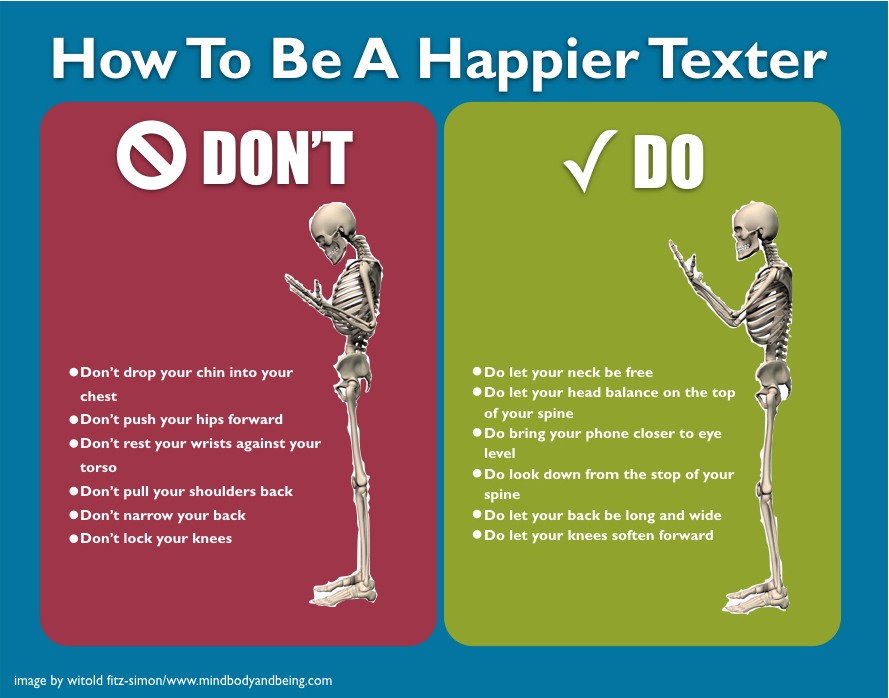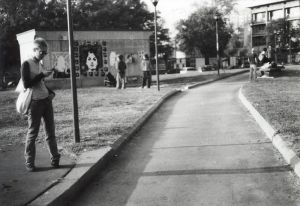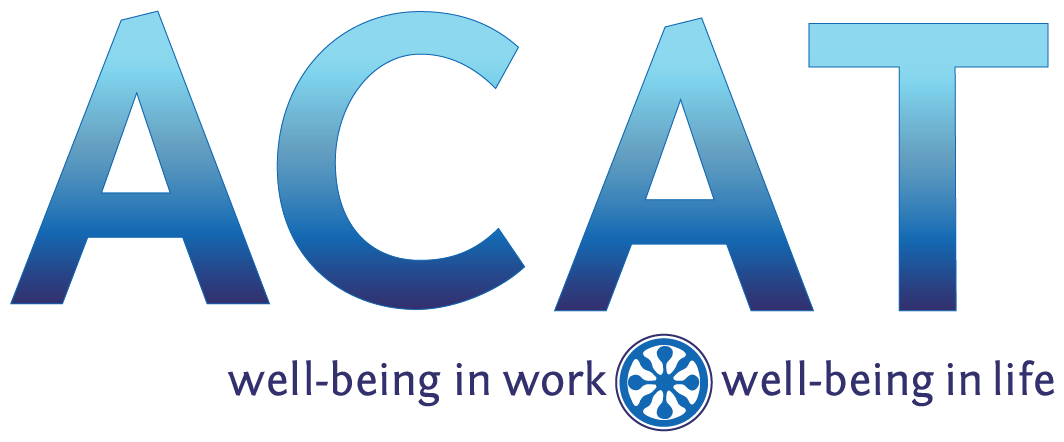Mark Josefsberg, Alexander Teacher and author of “Lighten Up: 29 Playful Lessons to help you learn the Alexander Technique” shares his story of discovering Alexander Technique and deciding to train with fellow ACAT Alumna N. Brooke Lieb.
Read moreHow To Be A Happier Texter
by Witold Fitz-Simon

The Alexander Technique can help you fine-tune the things you do in your life. Instead of your daily routine making you more tired, more compressed, more achy, it can help you find ease, lightness and freedom.
To find out more about how you can save your neck and make your back stronger and freer, come to one of our monthly free introductions to the Technique or to a drop-in group class.
[author] [author_image timthumb='on']http://www.acatnyc.org/main/wp-content/uploads/2014/01/After-crop1.jpg[/author_image] [author_info]WITOLD FITZ-SIMON has been a student of the Alexander Technique since 2007. He is certified to teach the Technique as a graduate of the American Center for the Alexander Technique’s 1,600-hour, three-year training program. A student of yoga since 1993 and a teacher of yoga since 2000, Witold combines his extensive knowledge of the body and its use into intelligent and practical instruction designed to help his students free themselves of ineffective and damaging habits of body, mind and being. www.mindbodyandbeing.com[/author_info] [/author]
“Text-Neck”: a Modern Epidemic and its Elegant Solution, The Alexander Technique
 by Witold Fitz-Simon
The internet has been a-buzz this week with the publication of a new study by surgeon Kenneth Hansraj, M. D. Using computer modeling, he was able to determine how much stress we are actually doing to ourselves when we drop our heads and collapse to look at our cell phones.
by Witold Fitz-Simon
The internet has been a-buzz this week with the publication of a new study by surgeon Kenneth Hansraj, M. D. Using computer modeling, he was able to determine how much stress we are actually doing to ourselves when we drop our heads and collapse to look at our cell phones.
An adult human head weighs anywhere between 10 and 12 pounds. When posture is good, with the top of the spine in a neutral position relative to the rest of the body, and the head poised in balance on the top vertebra, that weight is safely and effectively transferred down through the spine to the feet and the floor (or to your ischial tuberosities—your sitting bones—and to your chair if you are seated). If you take the head and the top of the spine forward by 15°, so Dr. Hansraj has determined, that weight effectively becomes 27 pounds. At 30° it becomes 40 pounds, at 45° 49 pounds, and at 60° it becomes 60 pounds. If you spend any amount of time with your head dropped forward, it’s as if you are carrying the equivalent of several large bags of groceries around at the top of your neck. Dr. Hanraj estimates that people spend an average of 700 to 1400 hours a year with the head stooped like this, and speculates that the average High School student might spend 5,000 hours a year like this.
Fixing a problem like this might seem simple. All you have to do is not drop your head. The reality of this is quite different. Dropping your head to look at your cell phone can be such an ingrained habit that you don’t even realize when you’re doing it. And when you do, just pulling your head back is not going to be the best solution. If you do that, you will have taken the tension in your neck from having your head forward and and added to it the tension of pulling your head back. A better solution is to learn how to free your neck and allow your head to remain poised on the top of your spine while you negotiate your phone in the first place. Luckily, the Alexander Technique can help you do just that in a simple and effective way.
The America Center for the Alexander Technique has a 50-year tradition of excellence in training Alexander Technique teachers. If you would like to find out more about the Technique, find one of our affiliated teachers here.
[author] [author_image timthumb='on']http://www.acatnyc.org/main/wp-content/uploads/2014/01/After-crop1.jpg[/author_image] [author_info]WITOLD FITZ-SIMON has been a student of the Alexander Technique since 2007. He is certified to teach the Technique as a graduate of the American Center for the Alexander Technique’s 1,600-hour, three year training program. A student of yoga since 1993 and a teacher of yoga since 2000, Witold combines his extensive knowledge of the body and its use into intelligent and practical instruction designed to help his students free themselves of ineffective and damaging habits of body, mind and being. www.mindbodyandbeing.com[/author_info] [/author]
